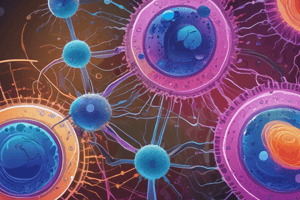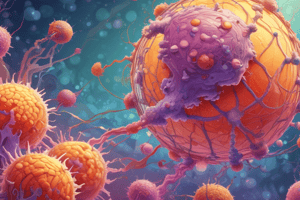Podcast
Questions and Answers
What type of cells are responsible for lysing cells infected with a virus?
What type of cells are responsible for lysing cells infected with a virus?
- T cells (correct)
- B cells
- Phagocytic cells
- NK cells
Which protein substance is developed by the body in response to and interacts with a specific antigen?
Which protein substance is developed by the body in response to and interacts with a specific antigen?
- Compliment
- Antibody (correct)
- Memory cells
- Interferons
Where do the precursors of all blood cells primarily reside?
Where do the precursors of all blood cells primarily reside?
- Kidneys
- Bone marrow (correct)
- Liver
- Spleen
Which lymphocytes are responsible for attacking foreign invaders (antigens) directly?
Which lymphocytes are responsible for attacking foreign invaders (antigens) directly?
What is the body's specific protective response to a foreign agent or organism called?
What is the body's specific protective response to a foreign agent or organism called?
Which type of cells are important for producing a humoral immune response?
Which type of cells are important for producing a humoral immune response?
What is the primary difference between primary and secondary immunodeficiencies?
What is the primary difference between primary and secondary immunodeficiencies?
Which condition involves the immune response turning against the body, leading to tissue damage?
Which condition involves the immune response turning against the body, leading to tissue damage?
What is the main function of natural (innate) immunity?
What is the main function of natural (innate) immunity?
Do leukocytes participate in both natural and acquired immune responses?
Do leukocytes participate in both natural and acquired immune responses?
Which cells fight invasion by releasing cell mediators like histamine and by engulfing foreign bodies or toxins?
Which cells fight invasion by releasing cell mediators like histamine and by engulfing foreign bodies or toxins?
Which white blood cells act as phagocytic cells and ingest greater numbers of foreign bodies than granulocytes?
Which white blood cells act as phagocytic cells and ingest greater numbers of foreign bodies than granulocytes?
Study Notes
Immune System Components and Functions
- Cytotoxic T cells are responsible for lysing cells infected by viruses.
- Antibodies, protein substances developed by the body, interact with specific antigens to neutralize threats.
- Bone marrow is the primary site where precursors of all blood cells reside.
- T lymphocytes, specifically cytotoxic T cells, attack foreign invaders (antigens) directly.
Immune Response
- The body's specific protective response to foreign agents or organisms is termed the adaptive immune response.
- B lymphocytes are important for producing a humoral immune response, which involves the secretion of antibodies.
Immunodeficiencies
- Primary immunodeficiencies are caused by genetic factors, while secondary immunodeficiencies result from external factors such as infections or medications.
Autoimmune Conditions
- Autoimmune conditions occur when the immune response mistakenly targets the body’s own tissues, leading to damage.
Immunity Types
- Natural (innate) immunity serves as the first line of defense against pathogens and provides immediate but non-specific protection.
- Leukocytes, or white blood cells, participate in both natural (innate) and acquired (adaptive) immune responses.
Phagocytosis and Cell Mediators
- Mast cells and basophils fight invasion by releasing cell mediators like histamine and by engulfing foreign bodies or toxins.
- Macrophages act as phagocytic cells, ingesting greater numbers of foreign bodies than granulocytes, helping to clear infections effectively.
Studying That Suits You
Use AI to generate personalized quizzes and flashcards to suit your learning preferences.
Description
Test your knowledge of immunology by matching key terms to their definitions. Practice identifying cytotoxic T cells, immunity, phagocytic cells, and T cells in this quiz.




![Lecture 03: Overview of Inflammatory Response in Immunology [SEQ 2]](https://images.unsplash.com/photo-1580795478966-561ba4f1ce68?crop=entropy&cs=srgb&fm=jpg&ixid=M3w0MjA4MDF8MHwxfHNlYXJjaHw1fHxpbmZsYW1tYXRvcnklMjByZXNwb25zZSUyQyUyMGltbXVuZSUyMHN5c3RlbSUyQyUyMGNlbGx1bGFyJTIwYmlvbG9neXxlbnwxfDB8fHwxNzM4NzI5MzYzfDA&ixlib=rb-4.0.3&q=85&w=300&fit=crop&h=200&q=75&fm=webp)